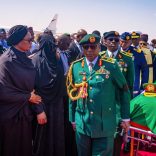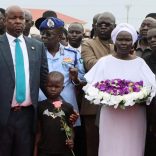Nigeria bids farewell to former leader Buhari with burial in home state
Essebsi: veteran politician who ushered in Tunisian democracy

Veteran politician Beji Caid Essebsi, who brushed aside concerns about his age when he was elected in his late 80s, helped shepherd his country to its first free nationwide ballot in the wake of the Arab Spring. He died Thursday aged 92.
“I have the age that I have,” he once told AFP, describing youth as “a state of mind”.
Tunisia’s first president to be democratically elected in nationwide polls, Essebsi passed away just months before his term ended, having already said he would not stand again in elections due in November.
Shrewd and wily, he was a long-time player on Tunisia’s political scene, serving under Habib Bourguiba, the father of Tunisian independence, as well as also under dictator Zine El Abidine Ben Ali.
After Ben Ali was deposed in 2011, Essebsi came to the fore as a supporter of the revolution and was elected in 2014, at the ripe age of 88, to steer the North African country.
His detractors had accused him of seeking to restore the regime of Ben Ali, who clung to power for 23 years before fleeing, combining authoritarian rule with a degree of prosperity and stability for his people.
But Essebsi stood his ground, saying former Ben Ali regime figures had the “right” to play a role in governing Tunisia alongside all political factions.
“We want a 21st century state, a progressive state,” Essebsi.
The son of an anti-Islamist lawyer born to a middle-class Tunisian family in 1926, Essebsi was to become the world’s oldest serving head of state after Britain’s Elizabeth II.
Political career
Born in Sidi Bou Said, a northern suburb of Tunis, he studied law in Paris and began practising in 1952.
After independence from France in 1956, he became an adviser to Bourguiba, holding a number of key jobs under him and later under Ben Ali.
Over the years, Essebsi was director general of the national police and interior minister. He later held the defence portfolio before becoming ambassador to France.
In April, the commission tasked with healing the wounds of dictatorship dug up accusations of complicity for his role in the 1960s as national security chief and later interior minister for keeping silent about on the torture of victims.
After a subsequent posting as Tunisia’s envoy to Germany, he was named foreign minister.
He also served in parliament, holding the speakership in 1990 and 1991.
Due to his political experience, and despite his advanced age, he was named prime minister in February 2011, amid the tumult of the revolution.
He was to lead the country to its first free elections in October 2011, won by the Islamist party Ennahda.
The following year he was key in founding the political party Nidaa Tounes, which brought together a mix of business men, academics, trade unionists and sympathisers of the old regime, united in their opposition to Ennahda.
Nevertheless, Nidaa Tounes was to ally with Ennahda after its 2014 electoral success, angering many of the party’s voters.
An official who had worked with Essebsi described him as endowed with “an extreme political intelligence and extraordinary pragmatism”.
In the second half of his mandate, in the run-up to new elections, Essebsi’s relationship with Ennahda leader Rached Ghannouchi deteriorated, leading to a split at the end of 2018.
Working for equality
Essebsi worked to establish a legacy as a guarantor of equality between men and women regarding inheritance, bringing a bill before parliament on the sensitive subject that is touched on in the Koran.
But debate bogged down in the run-up to this year’s elections, and Essebsi passed away without the bill coming to a vote.
While he often repeated that respect for human rights was a cornerstone of the new democracy, Essebsi’s detractors continued to accuse him of seeking to restore the regime of Ben Ali.
He spearheaded a controversial amnesty bill for people implicated in corruption allegations under the dictator.
Facing outcry, the text was revised to only include the officials accused of being implicated in administrative corruption scandals and not taking bribes.
He also said he was in favour of a more presidential regime, which would require revision of the 2014 constitution, one of the lasting achievements of the post-revolution period.
And while Essebsi repeatedly stressed freedom of the press, he would still at times lash out at critical media.
In the end appointing his son Hafedh head of the Nidaa Tounes party sparked controversy and contributed to party infighting, with Essebsi accused of seeking a dynastic succession — something he consistently denied.












Leave a Reply
Be the First to Comment!
You must be logged in to post a comment.
You must be logged in to post a comment.